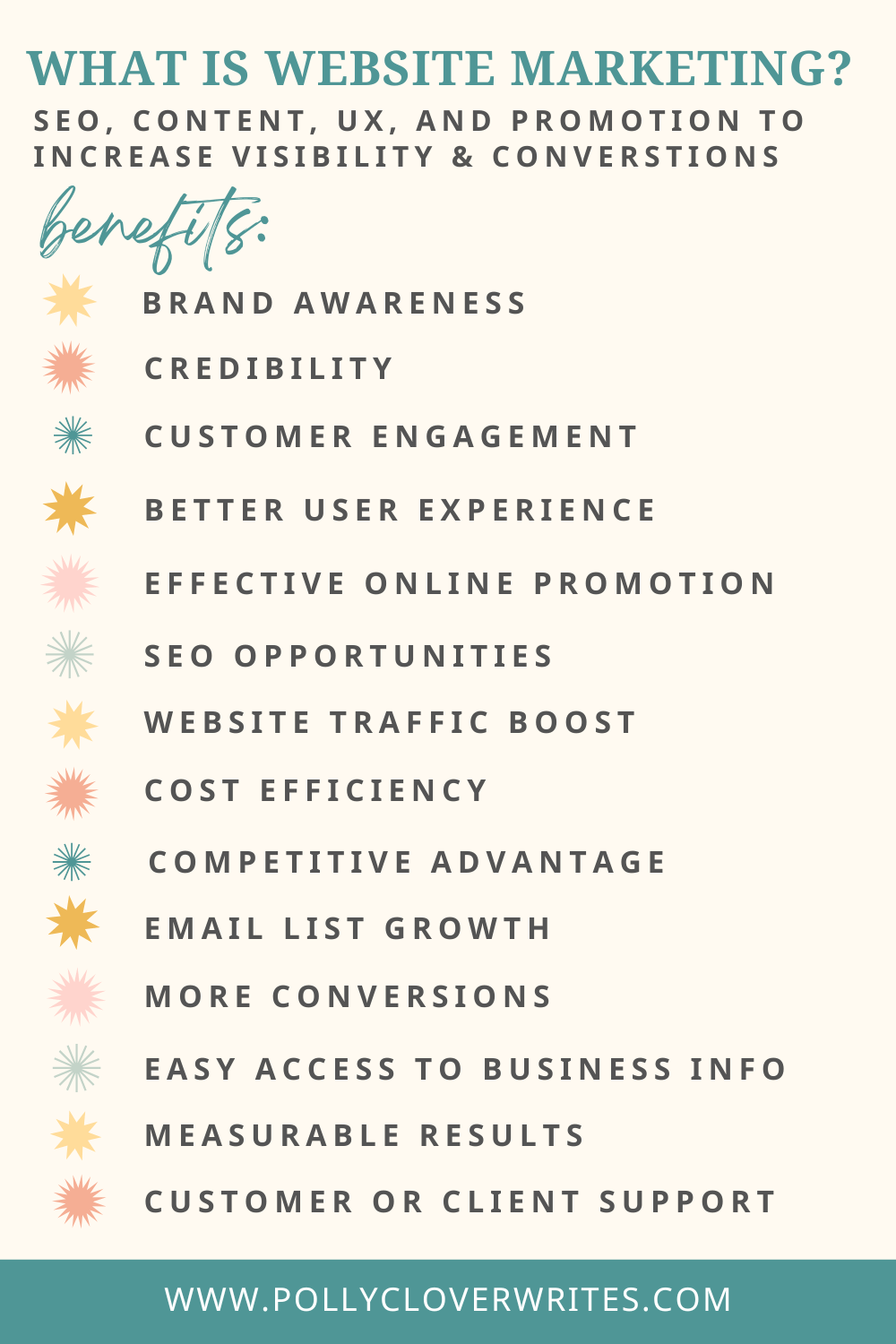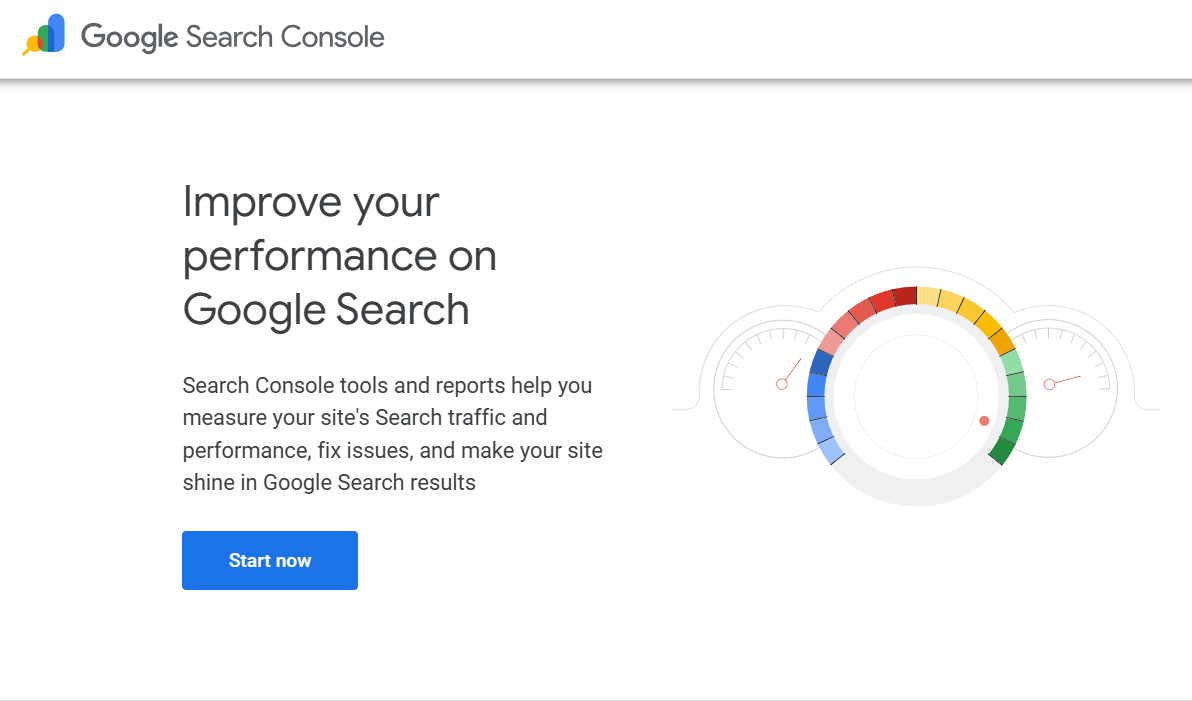What is website marketing? & How to Implement It
If you’re a small business owner or service provider, there’s a good chance you’ve wondered, what is website marketing? Website marketing is the process of using your site to attract, engage, and convert customers or clients. This strategy is how I’ve grown a successful business over the past several years.
Many businesses have a website but don’t use it to grow their brand. A strong website doesn’t just exist online — it implements a strategy that actively brings in visitors, builds trust, and makes sales. This is exactly what I help clients do through SEO blog strategy and management, and website copy that connects with a specific audience and drives results.
In this article, you’ll learn how website marketing works, its benefits, and strategies to implement a plan that helps you reach your goals.
How does website marketing work?
Website marketing works by combining content, search engine optimization (SEO), user experience, and promotion to reach your audience. When done consistently, it builds credibility, increases traffic, and supports long-term growth.
Key steps of website marketing include:
Creating content that informs and engages your ideal customers
Optimizing pages for search engines, including AI/LLM visibility
Using email, social media, and other channels to promote content
Adding calls to action, forms, and landing pages to convert visitors
The Benefits of Website Marketing
A marketing strategy for your website can help in many ways, from building brand awareness and credibility to more conversions and measurable results.
Pin & save for later
Brand awareness
Website marketing helps your business show up in AI and search engine results. Creating optimized content, including blog articles and service/product pages, makes your business easier to find when people search for related topics. This visibility introduces your brand before visitors even reach your site.
Here are a few ways your website can build brand awareness:
SEO & content marketing – Publish helpful blog posts to appear in Google search and AI
Service or product highlights – Feature popular or signature offers on your homepage or landing pages
Client testimonials and case studies – Share real results to build credibility
Consistent branding across pages – Use logos, colors, and messaging consistently
Credibility
A professional website communicates that your business is established and dependable. Clear service or product pages, a clean website design, and authoritative content make it easier for visitors to trust you.
Testimonials or reviews, case studies, and helpful resources reinforce your expertise and trustworthiness. They give first-time visitors confidence and encourage repeat engagement from current clients or customers.
While social media can also help build credibility, people closer to making a purchase often turn to your website to confirm reliability and make buying decisions.
Customer engagement
Website marketing allows visitors to interact with your business at every stage, from discovering your brand to making a purchase or booking a service. This engagement can help strengthen relationships, encourage repeat visits, and increase referrals.
Ways to engage your audience include:
Quizzes or assessments – Offer interactive tools that educate or entertain
Comment-enabled blogs – Invite discussion and feedback on your content
Downloadable resources – Provide guides, checklists, or templates your audience can use
Better user experience
When your website marketing strategy offers a good user experience (UX), it makes it easy for visitors to find information and take action. For example, make sure your website offers straightforward navigation and fast load speed.
A good UX keeps visitors on your site longer, prevents confusion, and increases the likelihood of conversions.
Effective online promotion
A website can work around the clock to communicate your offers and value. Blog posts, landing pages, and lead magnets share helpful information and showcase your services automatically.
Promotion should go beyond your site. For example, I share my website blog articles and service pages via email and social media. This helps increase reach without extra ad spend.
Here’s how I’ve shared this article in a LinkedIn post:
LinkedIn post promoting article for website marketing strategy
SEO opportunities
Optimized content helps your business appear in Google and AI-driven results, increasing visibility. Use keyword phrases your target audience is searching for. Tools like KeySearch, which is my go-to, make it easier to find relevant short- and long-tail terms.
SEO allows people to discover your website when they search for topics related to your business. This drives organic traffic and sets the stage for conversions.
Website traffic boost
Website marketing attracts more visitors by reaching new audiences. Regularly adding fresh content keeps people coming back and encourages shares for even more traffic.
To boost your traffic with website marketing, try:
SEO-friendly content – Create blog posts and pages that rank for keywords your audience is searching for
Guest blogging – Contribute articles to other sites or feature guest posts on your own to reach new audiences
Collaborations – Partner with other businesses or influencers to share audiences and expand reach (e.g., as a podcast guest)
Regularly updating articles and pages – Keep your website content fresh and relevant to encourage repeat visits and improve search visibility
Cost efficiency
Marketing through your website often costs less than other advertising, such as paid ads. SEO professionals have also reported an increase in return on investment (ROI) from search engine optimization.
By driving organic traffic, you can reduce ad spend, grow your email list, and convert visitors — all without extra cost. You can also reuse content across your blog, email campaigns, and social media, making your marketing efforts more efficient and consistent.
Competitive advantage
Having a website is standard, but implementing a marketing strategy sets you apart. Businesses without a plan often miss opportunities to engage visitors, build trust, and convert leads.
Share unique content, tools, or resources on your website to differentiate your business. Prioritizing a strategy helps you stand apart from competitors who aren’t leveraging their sites effectively — and many aren’t.
Email list growth
A website marketing strategy allows you to collect leads to nurture over time through email marketing. Use opt-in forms, lead magnets, or newsletter sign-ups to encourage visitors to join your list.
Once leads sign up, your email campaigns can share updates, promotions, or helpful content, keeping your business top-of-mind and encouraging repeat engagement.
I use Flodesk for email marketing and love it. It’s easy to create emails with ready-made templates, set up opt-in forms, and automate campaigns so you can stay connected with your audience.
More conversions
An effective website marketing strategy turns visitors into paying customers or clients. Make it easy for visitors to take action by using:
Clear calls-to-action (CTAs) – Tell visitors exactly what step to take next, like “Book a Free Consultation” or “Download Now”
Targeted landing pages – Create pages focused on a single offer or service to guide visitors toward conversion, like I do with my Blog Management page
Simple forms – Keep sign-up or contact forms short and straightforward to reduce friction
You can improve conversion rates over time by testing different page layouts, messaging, images, or CTA buttons. Experiment with form length or placement and compare results across landing pages to see what works best.
Easy access to business information
Your website makes key information easy for visitors to find. List hours, locations, services, and contact details clearly so people can quickly get what they need. A dedicated “Contact” or “Get Started” page is an ideal place for this information.
Keeping all your business details in one spot improves user experience, builds trust, and removes barriers to engagement or purchases. It makes it simple for your audience to connect with you and make informed decisions.
Measurable results
Website marketing allows you to track performance and understand your audience. Tools like your website’s analytics feature and Google Search Console show how visitors interact with your site, which pages they visit, and what content resonates.
To measure results, you can:
Analyze clicks – See which links, buttons, or calls-to-action your audience engages with most
Track traffic sources – Find out whether visitors come from search engines, email, social media, or other sources.
Measure conversions – Understand how many visitors take action, like signing up for your email list, booking a service, or buying a product.
These insights help you refine your marketing, improve content, and create offers that your audience finds most valuable. By measuring results, you ensure your efforts stay focused on practices that deliver the best outcomes.
Google Search Console to track your website performance
Customer or client support
Your website can guide people at every stage of the buying process, whether they’re exploring information to learn more or already working with you. FAQs, resources, and chat features make it easy for visitors to find answers quickly.
By offering this kind of support on your website, you build trust and reduce repetitive questions. It also creates a smoother experience that encourages people to return and engage with your business.
Website Marketing Strategies
Marketing a website effectively means using your site to actively attract visitors, engage your audience, and convert them into customers or clients. Here are practical strategies to make this work:
SEO – Optimize your website’s content, structure, and technical elements to help search engines and AI-driven platforms find your site and rank it higher. Using the right keywords and structuring pages correctly makes your content easier for your audience to discover.
Blogging and content marketing – Publish helpful blog posts and guides that attract visitors, provide value, and build trust. Content marketing positions your business as knowledgeable and keeps people coming back for more. Need help with this? Let’s chat!
Email marketing – Use newsletters, lead magnets, and updates to keep leads engaged, encourage repeat visits, and drive purchases or bookings. When you automate campaigns and share valuable content, you can nurture relationships over time.
Social media integration – Share website content on social platforms to increase traffic, audience engagement, and brand visibility. This keeps your business top-of-mind without relying solely on paid promotions.
Conversion optimization – Use clear calls-to-action, focused landing pages, and simple forms to guide visitors toward specific actions, turning them into leads or customers.
Analytics and tracking – Measure site performance to see what’s working and what needs improvement. Knowing how visitors interact with your site helps you fine-tune your marketing and prioritize what’s working.
Blog on my website for website marketing strategy
How to Do Website Marketing
To use your website as a marketing tool, start with these actionable steps:
Define your goals – Decide what you want your website to achieve, whether that’s attracting new clients, building an email list, and/or increasing sales. Refer back to this often to ensure you’re making the best decisions with your site.
Identify your audience – Understand who your ideal visitors are, what they’re searching for, and how they want to engage with your content. This helps ensure your website speaks directly to their needs.
Audit your website – Review your current site’s performance, content, and design. Identify what’s working, what needs improvement, and where there are gaps.
Plan content – Determine which blogs, pages, or offers you’ll create to attract and engage your audience. Focus on content that provides value and aligns with your goals.
Promote your site – Share your content via SEO, email, and social media. Consistent promotion ensures your website reaches the right audience at the right time.
Track results – Use website analytics and tools like Google Search Console to see how individual pages are performing and learn more about your audience. Monitoring these kinds of results lets you make informed decisions.
Refine and repeat – Adjust your strategy based on insights and performance. Regularly updating your content, testing approaches, and refining your strategies helps your website marketing continue to grow over time.
What is website marketing? Conclusion
Website marketing turns your site from a passive online brochure into a business tool that drives sustainable growth. It helps you attract the right audience, build credibility, and guide visitors toward taking meaningful action.
If you’re ready to put your website to work, I can help. I offer SEO blog writing, audits, website copy, and power hour strategy sessions that help you meet your goals. Check out my offers here or reach out to see what’s right for you.






